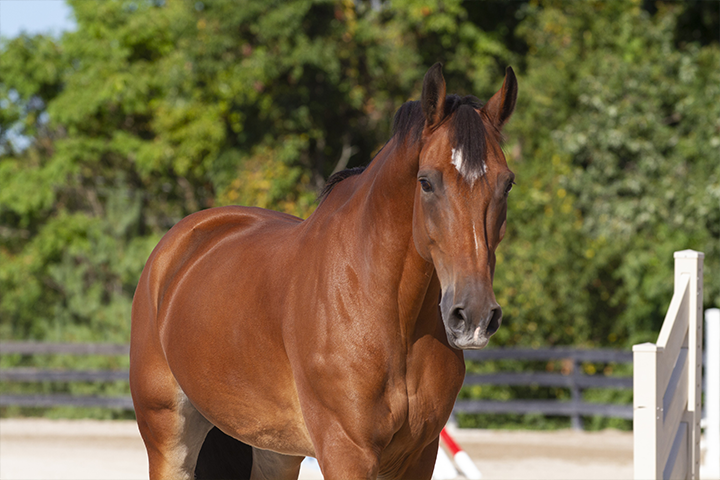-
Developmental Orthopedic Disease (DOD)
Developmental Orthopedic Disease is a common complication of growth in the young foal. Genetics, management, and nutrition are all implicated for their role in predisposing or exacerbating developmental abnormalities in the young horse. Specific nutritional guidelines should be followed to limit the risk of abnormal musculoskeletal growth in the foal.
Read More -
Food Allergy
It can be difficult to pinpoint the true case of a horse’s allergic symptoms. Environmental allergies are significantly more common than food allergies, which can only truly be diagnosed through an elimination diet. If the offending ingredient can be identified, enlist the help of a nutritionist to recommend an appropriate commercial product or to formulate a custom diet.
Read More -
Gastric Ulcers
Gastric ulceration in the horse is a highly prevalent, yet often difficult to manage condition. The development of gastric ulcers is a function of multiple factors including breed, exercise level, diet, and management. Because of the multi-factorial nature of this disease state, a multi-faceted approach including medical treatment, management changes, and nutritional intervention is necessary to best support horses with gastric ulcers. Dietary management is critical in reducing the risk of developing gastric ulcers and supporting optimal gastric health.
Read More -
Orphan Foals
Newborn foals are precocious, active and grow at an incredible rate. They are capable of standing and galloping within a few hours of birth and grow at a rate of 1 – 2 kg/day over the first month. The death of a mare is a tragedy that will be compounded if her orphaned foal is not quickly placed on an effective feeding and care program that closely mimics that of the suckling foal. With proper nutrition and veterinary support, orphan foals can be managed and successfully developed into healthy adults.
Read More -
Respiratory Disease
Nutritional management of horses with respiratory disease should be focused on reducing the airborne particulate that causes airway inflammation and mucous buildup. Certain strategies can be applied to dietary selection and feeding practices to help support horses with these aggravating conditions.
Read More -
Pituitary Pars Intermedia Dysfunction (PPID)
Pituitary Pars Intermedia Dysfunction (PPID) is a disease characterized by the slow, progressive degeneration of hypothalamic dopaminergic neurons, which in turn leads to adenoma formation in the pars intermedia and resultant hormonal imbalances. PPID can result in insulin dysregulation, muscle wasting, and underweight and overweight phenotypes which is why close attention to nutritional factors is important to management of the disease.
Read More -
Obesity
Addressing weight gain in horses is multi-factorial. Controlling pasture and/or forage intake, feeding a ration balancer or low-calorie feed, and encouraging exercise are all required. Weight can be monitored via body condition scoring and utilization of a weight tape. For horses that are obese (body condition score 7+ and/or show signs and symptoms of insulin resistance or endocrinopathic laminitis) refer to Feeding Metabolic Horses for more specific recommendations for that condition.
Read More
-
Renal Disease
Renal disease is relatively uncommon in horses but when it does occur, nutrition plays an important role in both the recovery from acute, and management of chronic, kidney failure. In the short-term it is most important to ensure intake of nutrients, whether voluntary or not, and maintain electrolyte balance. During chronic disease, maintenance of hydration status, body condition and creatinine levels are emphasized.
Read More -
Choke/Esophageal Obstruction
Choke (esophageal obstruction) is an ever-present risk for all horses. Certain management strategies and nutritional interventions can reduce the risk of choke in horses, and for horses with a history of choke, nutritional management can be critical in reducing the risk of future episodes.
Read More -
Muscle Disorders
Muscle disorders cause loss of performance and value in affected horses and may present with a variety of clinical signs ranging from muscle stiffness and pain to muscle atrophy, weakness, exercise intolerance, and muscle fasciculations. Although originally thought to be a single clinical syndrome, it is now clear that these clinical manifestations are common to several different muscle disorders with different etiologies.1 Recently metabolic, inflammatory, dystrophic and other inherited muscle diseases have been described in horses. Proper diagnosis of the specific myopathy involved is critical for determining the appropriate targeted management regimen.
Read More -
Weight Loss
There are many potential causes that can result in a horse having poor body condition. After determining the reason(s) why the horse is losing weight or failing to thrive, implementing a successful weight gain program is a fundamental aspect of returning the horse back to good health. Selecting feed components that maximize digestibility and caloric density of the ration will help to achieve weight gain in a safe an effective manner.
Read More

A big advance in equine microbiome science is here
Introducing the Purina® Microbiome Quotient™ platform, a new way to connect your horse’s gut health to their wellbeing and performance.
Coupons for Your Clients
Request valuable Purina feed coupons to share with your clients when making feeding recommendations. Coupons can be requested by veterinarians and vet techs only. Your request must include your license number. Please allow up to 4 weeks for your coupons to be shipped to you.
Request your couponsConsult with a Ph.D. Equine Nutritionist
Our experts are standing by to answer your toughest questions. Request a complimentary consultation with a Purina Ph.D. equine nutritionist.
Request a ConsultWellSolve® Well-Gel®
Available exclusively to veterinarians, WellSolve® Well-Gel® is a nutritionally complete, low-bulk enteral supplement formulated specifically for horses. When fed as directed, it supplies 100% of daily protein, vitamin, and mineral requirements. Well-Gel® can be easily administered through a nasogastric tube but is also palatable enough to offer for voluntary consumption..
Learn More About Well-Gel®
Nutritional Management of Common Equine Conditions
Nutrition and Feeding Guidelines
Feeding Senior Horses - A Quick Reference
Reference chart containing specific feeding recommendations for senior horses based on special needs.
CLICK TO READNutrition Consultation Recommendations
General nutrition recommendations for different classes of horses and for horses with special needs.
CLICK TO READFeeding Metabolic Horse Guidelines
Informational article that discusses feeding strategies for obese horses and horses with Equine Metabolic Syndrome.
CLICK TO READEquine Gastric Health Program Guide
Information brochure for clients that contains helpful information on how to recognize risk factors and signs of gastric discomfort, emphasizes the importance of proper medical treatment, and gives feeding and management tips for horses that are at risk for or that are experiencing gastric discomfort.
CLICK TO READNutritional Management of Horses with Acute and Chronic Renal Failure
Renal disease is relatively uncommon in horses but when it does occur, nutrition plays an important role in both the recovery from acute, and management of chronic, kidney failure. In the short-term it is most important to ensure intake of nutrients, whether voluntary or not, and maintain electrolyte balance. During chronic disease, maintenance of hydration status, body condition and creatinine levels are emphasized.
CLICK TO READFeeding Program for Orphan Foals
Newborn foals are precocious, active and grow at an incredible rate. They are capable of standing and galloping within a few hours of birth and grow at a rate of 1 – 2 kg/day over the first month. The death of a mare is a tragedy that will be compounded if her orphaned foal is not quickly placed on an effective feeding and care program that closely mimics that of the suckling foal. With proper nutrition and veterinary support, orphan foals can be managed and successfully developed into healthy adults.
CLICK TO READFeeding Horses with Pituitary Pars Intermedia Dysfunction (PPID)
Pituitary Pars Intermedia Dysfunction (PPID) is a disease characterized by the slow, progressive degeneration of hypothalamic dopaminergic neurons, which in turn leads to adenoma formation in the pars intermedia and resultant hormonal imbalances. PPID can result in insulin dysregulation, muscle wasting, and underweight and overweight phenotypes which is why close attention to nutritional factors is important to management of the disease.
CLICK TO READNutritional Management of Horses with Respiratory Disease
Nutritional management of horses with respiratory disease should be focused on reducing the airborne particulate that causes airway inflammation and mucous buildup. Certain strategies can be applied to dietary selection and feeding practices to help support horses with these aggravating conditions.
CLICK TO READProfessional Resources
Purina Horse Feed Major Nutrient Content Chart
Quick reference chart that contains nutrient guarantees and non-structural carbohydrate content for all Purina Horse feed products.
CLICK TO READInterpreting a Hay Analysis
Reference document that provides expected ranges to support the interpretation of a forage analysis report.
CLICK TO READRelative Feed Value
Reference document that provides expected ranges for % crude protein, acid detergent fiber, neutral detergent fiber, and relative feed value to support the interpretation of forage analysis reports.
CLICK TO READWellSolve Well-Gel Product Information
Product information sheet for Purina WellSolve Well-Gel, an enteral diet for horses, including feeding directions and guaranteed nutrient analysis.
CLICK TO READWell-Gel Calorie Addition
How to add calories to WellSolve Well-Gel when using for more than 5 days as sole source of nutriiton.
CLICK TO READAnswers from our Experts
What do you recommend feeding a horse with low blood levels of vitamin E?

Karen Davison, Ph.D.
Vitamin E is one of the body’s most potent antioxidants affecting immune function, the neuromuscular system and reproduction. The best dietary source of vitamin E is growing green grass, but since many horses do not have consistent pasture access, vitamin E supplementation is needed. Read More
What signs should I look for in my clients’ horses related to ionophore toxicity? What do feed manufacturers do to protect against feed contamination?

Robert Jacobs
Feed contamination is a critical risk of feed manufacturing that all reputable feed manufacturers should account for. Proper “feed hygiene” is crucial to minimize the health risks to horses due to physical, chemical or biological contamination. Read More
Where can I find good, science-based information to refer to when I have questions related to equine nutrition?

Kelly Vineyard, M.S., Ph.D.
Many helpful equine nutrition resources are available for equine veterinarians, including textbooks, scientific publications, reputable websites and personal consultation with an experienced and credentialled equine nutritionist. Read More
What should the refeeding plan be when rehabilitating a severely malnourished horse?

Kelly Vineyard, M.S., Ph.D.
A complete veterinary exam is the first step to rehabilitation, including an assessment of liver, kidney and gastrointestinal function to check for underlying conditions. Following the exam, a refeeding plan that facilitates weight gain but avoids potential complications can be implemented. Remember to record initial body weight and take photographs of the horse to document current condition and future progress. Read More
What is the difference between nutritionally managing horses with PSSM1 (Type 1 Polysaccharide Storage Myopathy) vs. PSSM2 (Type 2 Polysaccharide Storage Myopathy)?

Karen Davison, Ph.D.
PSSM1 and PSSM2 are different disorders with slightly different recommendations for nutritional management. Read More
What nutritional strategies support proper joint development in young horses?

Robert Jacobs, Ph.D.
Joint and bone abnormalities, collectively known as developmental orthopedic disorders (DODs), are a common growth complication in young horses. There are several nutritional strategies to support proper joint development, but it’s critical to remember that DODs are a function of many factors, including genetics, management and nutrition. A multifaceted approach may limit the incidence and severity of DODs. Read More
What are some guidelines for feeding a horse after colic?

Kelly Vineyard, M.S., Ph.D.
Developing a post-colic feeding plan depends on the nature of the colic episode, and whether surgery was performed or not. Read More
Are there any special nutritional considerations for a horse recovering from a soft-tissue injury while on stall rest or turnout?

Mary Beth Gordon, M.S., Ph.D.
Nutrition is important during the recovery period because it helps support a horse’s inherent healing powers. Energy management is key for horses on stall rest. Injured horses should be kept quiet during the recovery period to prevent further aggravation of the injury. Read More
My clients often ask about joint supplements for their horses. How do I determine which ones to recommend? Help!

Mary Beth Gordon, M.S., Ph.D.
Joint supplement questions abound! A veterinarian survey conducted in 2017 by Purina Animal Nutrition determined joint supplements were the No. 1 supplement question veterinarians received from their clients. With upward of 500 joint supplements on the market, it’s no wonder horse owners have questions and want recommendations. Read More
We occasionally see horses in our clinic that are sick and have gone off feed. What are some feeding options to ensure they are receiving the nutrition they need for recovery?

Kelly Vineyard, M.S., Ph.D.
When a horse has little to no appetite, it’s a sign of serious illness. If the gastrointestinal tract is functional and the underlying cause of inappetence has been addressed, it’s critical to get the horse eating again to help maintain proper gut function, deliver calories and nutrients essential for healing, and prevent weight loss. Read More
When should I recommend my client obtain a hay analysis, and what forage analysis labs do you recommend? How do I help my client interpret the results?

Kelly Vineyard, M.S., Ph.D.
You might recommend a forage analysis when managing the diet of a horse with sugar and starch sensitivities, when treating a horse experiencing chronic colic or digestive upset, or if you suspect a potential nutrient deficiency or toxicity (i.e., selenium). Obtaining a forage analysis is also a good practice to help owners better understand how forage contributes to their overall nutrition and feeding program, especially when hay is purchased in bulk. Read More
How do we provide a balanced diet to a performance horse with a suspected food allergy?

Anna Pesta, Ph.D.
With increasing frequency, equine nutritionists are being asked to review the results of serum allergy tests. It’s not uncommon for results to show dozens of positively reacting allergens. Frustrated clinicians or owners understandably ask, “What on earth can we feed this horse?” Read More
Do my clients really need to creep feed their foals?

Mary Beth Gordon, M.S., Ph.D.
It’s that time of year when foals arrive or are already on the ground, and we’re quickly approaching weaning. The best foal feeding advice to give your clients is to creep feed their foals. Creep feeding requires a specialized feeding environment that allows the foal to access feed but does not allow the mare access. Creep feeding enables foals to become accustomed to the diet they will consume post-weaning and enables their GI tract to gradually adapt to the change from milk to concentrate feed. Read More
What feeding recommendations can I make to help support weight gain in these horses?

Kelly Vineyard, M.S., Ph.D.
When feeding the non-obese, insulin-resistant horse, the foundation of the diet should be free-choice, good quality forage that is low in soluble carbohydrates (≤10-12% starch + water soluble carbohydrates or WSC). Read More
What nutritional needs should be considered for stallions during breeding season?

Robert Jacobs
A stallion’s nutritional needs are similar to other adult active horses, with consideration given to the increased requirements specifically related to breeding. A stallion actively competing, performing or training has elevated nutritional needs, which should be met while also accounting for incremental nutrition needed for breeding. Read More
What nutritional strategies can be used to support horses experiencing chronic colic symptoms?

Robert Jacobs, Ph.D.
Dealing with horses experiencing chronic colic or repetitive colic episodes can be highly frustrating for both owners and veterinarians. Many conditions—including gastric ulcers, enteroliths, uroliths and others—may result in frequent bouts of colic. Horses should be screened for these conditions and treated appropriately. However, many cases of chronic colic require changes to the horse’s diet. Read More
What’s the ideal body condition for a mare preparing to be bred? Are there any specific nutrient requirements or suggestions to optimize fertility?

Anna Pesta, Ph.D.
Body condition score (BCS) is the variable most likely to impact reproductive efficiency. Success depends on what shape mares enter the breeding season in. Evaluation of BCS should occur at least 90 days ahead of breeding to allow time to make progress, either in weight gain or loss, towards an ideal BCS of 5-7. Read More
Team Purina
Introducing the Purina professionals behind the latest equine research and innovation.



